Socialists cry “Power to the people” and raise the clenched fist as they say it. We all know what they really mean – power over people, power to the State.
—Margaret Thatcher—
To take from one because it is thought that his own industry and that of his father’s has acquired too much, in order to spare to others, who, or whose fathers have not exercised equal industry and skill, is to violate arbitrarily the first principle of association-the guarantee to every one of a free exercise of his industry and the fruits acquired by it.
—Thomas Jefferson—
Socialism of any type leads to a total destruction of the human spirit.
—Aleksandr Solzhenitsyn—
~~~~~~~~~~~~~~~~~~~~~~~~~~~~
Key points: The social justice movement is infiltrating American society and the church. It is unbiblical and dangerous, and it must be opposed. Christians must be informed about it from a biblical perspective in order to warn others. The situation is urgent.
~~~~~~~~~~~~~~~~~~~~~~~~~~~~
Note: I’m offering a portion of this article in a PDF file so it can be conveniently utilized in Bible studies by individuals and groups.
A Bible study based on this article is available here, and a follow-up study here.
Under the “feel good” mantras of compassion, justice, and fairness; the social justice movement (SJM) promotes socialism and Marxism and maligns capitalism as oppressive and unfair. Social justice advocates pit whites against blacks, men against women, and heterosexuals against homosexuals and other LGBT individuals
Some social justice crusaders are well intentioned, but many have nefarious motives and know full well what they are doing. They say that blacks, women, and homosexuals are oppressed by a society and culture stacked against them. Their rhetoric notwithstanding, things are not always as they appear; nor are they always as the prevailing narrative depicts them. We will do well to learn in practical terms just where the social justice movement with its Marxist underpinnings is taking the United States as nation and American citizens as individuals.

Moreover, as Christians, we must evaluate the social justice movement in light of biblical teachings. This movement and its teachings have invaded the church! Do Marxism and social justice tenets align with Scripture at all, or do these movements stand together in opposition to what the Bible tells us about economic and social systems and human activity within them?
Does the Bible even have anything at all to say about economic and social systems? Actually, yes, it does; and what it has to say may surprise you. In this post we’ll contrast several tenets of the SJM to biblical teachings and show that they are two very different belief systems that promote opposite ideas.
First, it’s important to become familiar with some key terms and what they mean. Here are some definitions (also go here) of terms we will use in this article, or that are related to ideas presented in the article. They include
-
- socialism
- Marxism
- communism
- capitalism or free enterprise
- social justice
- woke
- cultural Marxism
- critical race theory (CRT)
- intersectionality
Fairness Does not Mean Equal Outcomes
We began by noting that “[u]nder the ‘feel good’ mantras of compassion, justice, and fairness, the social justice movement promotes socialism and Marxism and maligns capitalism as oppressive and unfair. ” Is capitalism really unfair? We addressed this question to an extent in a series titled “The Bible and Free Enterprise.” Here is an article that summarizes the key ideas we presented in that series.

Despite the message conveyed in today’s prevailing narrative, capitalism provides the greatest amount of freedom, the greatest incentive for productivity and creativity, and the greatest number and kinds of benefits for both producers and consumers. Yes, capitalism can be abused, but when the players operate within the ethical guidelines the free market expects, it works as does no other system to enhance prosperity and diminish poverty. By contrast (contrary to what you’ve likely heard) socialism and Marxism turn citizens into slaves of the state. Implementation of socialist (and social justice) principles squelches productivity and creativity and incites envy and greed.
As we noted in our definitions of key terms, whereas Marxism focuses on economics, cultural Marxism takes Marxist principles and applies them to cultural categories like race, class, sex differences, and sexual behavior (or what LGBT advocates would call sexual orientation). All the envy, greed, resentment, and hostility that Marxism brings to economic categories are given fertile ground in these other categories by cultural Marxism and its teachings. All of this relates directly to the social justice movement, because the SJM has Marxist underpinnings. It sees racism everywhere it looks, and it even finds racism where none exists. It stirs up animosity, hatred, and division as does no other ideology.
Why has the social justice movement been so successful at throwing up all these relational barriers? Here are two major reasons. First, because of a distorted understanding of justice. You see, fairness does not mean equal outcomes, but equal opportunities — and equal opportunities means people are equally unhindered by government and by other individuals and entities from pursuing their dreams. Nor does justice mean equal outcomes. As Dr. Calvin Beisner contends in his excellent booklet “Social Justice: How Good Intentions Undermine Justice and Gospel,” Exercising and promoting justice means “rendering (1) impartially and (2) proportionally (3) to everyone his or her due (4) in accord with the righteous standard of God’s moral law.” You can order an updated and expanded edition of Dr. Beisner’s booklet here.
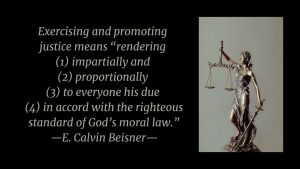 A second reason the social justice movement and Marxism have been so successful in stoking conflict between groups is because of a distorted understanding of true freedom and liberty. As Josh McDowell has observed, freedom isn’t being able to do whatever you want to do; it’s having the power to do what you ought to do. Thus, freedom and liberty — and happiness as well — are tied inseparably to duty and responsibility. These are opposite sides of the same coin.1
A second reason the social justice movement and Marxism have been so successful in stoking conflict between groups is because of a distorted understanding of true freedom and liberty. As Josh McDowell has observed, freedom isn’t being able to do whatever you want to do; it’s having the power to do what you ought to do. Thus, freedom and liberty — and happiness as well — are tied inseparably to duty and responsibility. These are opposite sides of the same coin.1
 Against this backdrop, let’s examine nine biblical principles and showcase them against numerous statements made by Karl Marx. What more direct way could there be to examine Marxism than to read what Marx himself wrote and believed? I have taken Marx’s statements from just one Internet quotations website, azquotes.com; I did not do extensive research to “dig them up.” In other words, these are predominant, well-known statements from Marx. As you read these, note how Marxist ideals have taken hold in various places and among numerous leaders in our own country. Also note how thoroughly they are gaining a foothold in society at large.
Against this backdrop, let’s examine nine biblical principles and showcase them against numerous statements made by Karl Marx. What more direct way could there be to examine Marxism than to read what Marx himself wrote and believed? I have taken Marx’s statements from just one Internet quotations website, azquotes.com; I did not do extensive research to “dig them up.” In other words, these are predominant, well-known statements from Marx. As you read these, note how Marxist ideals have taken hold in various places and among numerous leaders in our own country. Also note how thoroughly they are gaining a foothold in society at large.
Marxism Is Unbibilcal, and Even Anti-Biblical and Anti-Christian
Principle 1: The God of the Bible, and none other, is God; and we are to acknowledge and revere Him and Him only. (See Ex. 20:1-3; Deut. 5:5-7; 13:4; Neh. 9:6; Ps. 14:1.)
By contrast, Marx said,
-
- Communism begins where atheism begins.
- My object in life is to dethrone God and destroy capitalism.
- There are, besides, eternal truths, such as Freedom, etc., that are common to all states of society. But Communism abolishes eternal truths, it abolishes all religion, and all morality, instead of constituting them on a new basis; it therefore acts in contradiction to all past historical experience.
Principle 2: God created every member of the human family in His image. Everyone is a sovereign2 individual, and every person should be treated with dignity and respect. (See Gen. 1:26-28; 9:6.)
Marx denied this biblical tenet. He said,
Principle 3: The Bible commends hard work and the benefit of enjoying the results of one’s labor. (See Prov. 6:6-11; 10:4-5; 12:14; 13:4; 14:23; 16:26; 22:29; 28:19; Eccl. 3:9-13; 2 Thess. 3:6-12.)
On the other hand, Karl Marx said:
-
- A heavy or progressive or graduated income tax is necessary for the proper development of Communism.
- From each according to his abilities, to each according to his needs. Marx was referring to government redistribution of wealth, a tenet of the social justice movement.
Adrian Rogers was right when he observed,

You cannot legislate the poor into freedom by legislating the wealthy out of freedom. What one person receives without working for, another person must work for without receiving. The government cannot give to anybody anything that the government does not first take from somebody else. When half of the people get the idea that they do not have to work because the other half is going to take care of them, and when the other half gets the idea that it does no good to work become somebody else is going to get what they work for, that my dear friend, is about the end of any nation. You cannot multiply wealthy by dividing it.
Principle 4: In connection with human sovereignty (having been made in God’s image) the Bible affirms property rights. (See Ex. 20:15,17; Deut. 5:19,21.)
Karl Marx was vehemently opposed to the idea of private property.
The theory of Communism may be summed up in one sentence: Abolish all private property.
Alarmingly, aversion to property rights is taking hold in America — but of course that doesn’t mean people are willingly getting rid of their stuff. They just think they like the idea of a society where everyone has his or her needs met, even if it means they are bereft of material goods. The matter of how people can have their needs met if they can’t own anything apparently doesn’t strike them as strange. Don’t misunderstand. I’m all for people’s needs being met, but within reality’s limits. Here is the truth. Socialism works only in people’s imaginations. It doesn’t meet people’s needs; it multiplies them!
Watch this video produced by the World Economic Forum (WEF), and note this key message. What’s wrong with it? Well, quite a bit, actually! Learn more here!

Principle 5: The Bible affirms economic freedom, including the exchange of what one owns for something else.3 This implies benefit for both the buyer and the seller. (See Genesis 23; Matt. 13:44-46; 20:1-16; 24:45-51; 25:14-30; Mark 12:1-9; Luke 10:25-37.)
Karl Marx viewed economic freedom with disdain.
Yet capitalism does increase wealth and decrease misery simultaneously. Furthermore, we need to be aware that communism, socialism’s sister, doesn’t alleviate misery at all. Rather, it creates and exacerbates it.
Principle 6: The Bible commends charity from individuals, the church, and, by extension, faith-based organizations. (See Lev. 19:9-10; 23:22; Deut. 24:20-22; Prov. 14:21; 17:5; 19:17; 22:9; 28:3; 29:7; Acts 11:27–30; Rom. 15:25–27; 1 Cor. 16:1–4; 2 Cor. 8:1–9:15; Gal. 2:9-10; Eph. 4:28.)

Karl Marx believed the state should take from those who have to give it to those in need. With socialism, government coercion is the order of the day.
From each according to his abilities, to each according to his needs.
Principle 7: Parents are responsible before God for the education and training of their children. (See Deut. 6:4-25; Prov. 1:8; 3:12; 6:20; 10:1; 13:1,24; 15:20; 17:25; 22:15; 23:13-14; 28:7; 29:15; Eph. 6:1-4. Do not be overly concerned about the references in Proverbs to “beating” one’s child or children. The emphasis is on appropriate discipline; this is not authorization for abuse.)
Karl Marx, by contrast, believed that children belonged to the state.
Consider the recent battles between parents and the education elites in school boards across America with regard to what children will be taught. Tell me, does the state own America’s children, or are parents ultimately responsible for them? We are at a crossroads in America with regard to this issue. It’s time for parents, and Christian parents in particular, to take a stand!
Principle 8: Government’s job is to maintain order in society by commending those who do right and punishing those who do wrong. Nowhere in Scripture do we see any indication that it is government’s job to meet people’s needs. (See Rom. 13:1-7; 1 Pet. 2:13-17; 1 Tim. 2:1-2.)
Karl Marx believed in upsetting and overthrowing order and establishing a “new order” rooted in socialist and communist principles. Note the ruthless nature of the following statements from Marx.
-
- We have no compassion and we ask no compassion from you. When our turn comes, we shall not make excuses for the terror.
- Catch a man a fish, and you can sell it to him. Teach a man to fish, and you ruin a wonderful business opportunity.
- …the Communists everywhere support every revolutionary movement against the existing social and political order of things… They openly declare that their ends can be attained only by the forcible overthrow of all existing social conditions.
- The meaning of peace is the absence of opposition to socialism.
Principle 9: Remembering a godly heritage and God’s redemptive work keeps individuals and nations from straying away from the the truth and from right living. (See Ex. 12:1-28; Deut. 5:12-15; 6:4-25; 24:17-19; Josh. 4:1-24; 1 Cor. 11:23-26; Eph. 2:11-13.)
Karl Marx understood that distorting and misrepresenting a nation’s heritage would make the people vulnerable to takeover. It’s working. Everyone readily acknowledges that our Founding Fathers were not perfect, but can we not honor them for the heritage of liberty the bequeathed to us — one that, in the end, eliminated slavery and established civil rights for all? Even now America’s not perfect, but she has come a long way toward realizing her founding ideals of equal opportunity for all.
Here are three statements from Karl Marx that show He understood how to create and maintain social upheaval. On this issue, Marx was correct. Americans need to be wise to these insights today.
Conclusion
Here are three important takeaways from this post:
-
- Marxism is taking hold in America, and a primary vehicle for this invasion and ongoing cultural realignment is the social justice movement.
- Marxism and the social justice movement stand contrary to freedom, opportunity, and prosperity for all. Freedom-loving people everywhere must speak against them and educate their children to be wary of them.
- Christians especially need to understand that the tenets of the social justice movement are antithetical to biblical teachings and therefore anti-Christian. Pastors need to be preaching against the social justice movement, and Christians in the pews need to be warning their brothers and sisters in Christ about it.

You can start by sharing this article. Read Dr. Beisner’s booklet on social justice (also available here). Host a Bible study! Be informed, inform others, and pray that God will open people’s eyes everywhere to the dangers of Marxism and the social justice movement.
Nothing less than the future of liberty, which includes the freedom to share the gospel with others, is at stake.
Copyright © 2021 by B. Nathaniel Sullivan. All rights reserved.
Unless otherwise indicated, Scripture has been taken from the New King James Version®. Copyright © 1982 by Thomas Nelson, Inc. Used by permission. All rights reserved.
Notes:
1We explore both of these ideas in the 6-session Bible study series titled “Principles of Economic Liberty: The Biblical Case for Free Enterprise.” We talk about the connections between liberty and responsibility in session 3 and about the meaning of authentic justice in session 6. Please consider using this material in your own personal study or with a group. Currently the series is available online and free of charge.
2The word sovereign is used here, not in the ultimate sense, for only God is sovereign in this way. It is used to convey the idea that human beings have qualities that reflect that God has made them in His image, and that set them apart from the rest of God’s created order. Thus, human sovereignty does not mean that people are godlike, but that they are like God — capable of having preferences, making judgments, understanding and making moral and ethical choices, and designed to be free, not manipulated or controlled by the government.
3This is the eighth principle presented in the Bible study series “Principles of Economic Liberty: The Biblical Case for Free Enterprise.” The list of ten principles the study examines is based on an important paragraph in an article about capitalism by the late theologian Dr. Ronald Nash.
top image credit: photo by Clay Banks on Unsplash


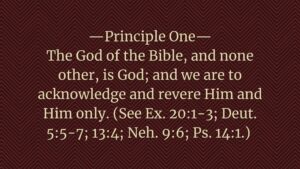
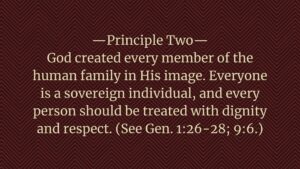
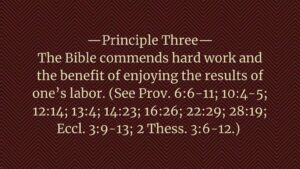
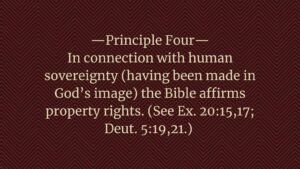
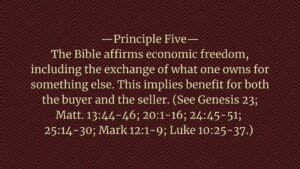
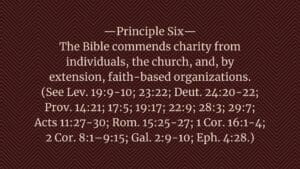
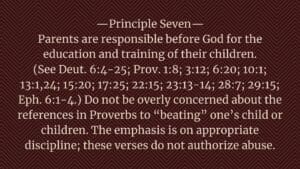
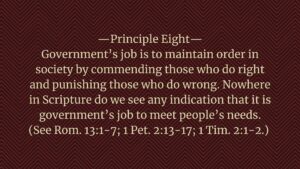
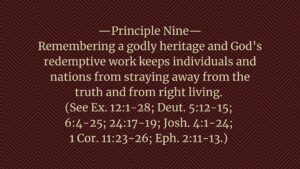
Be First to Comment